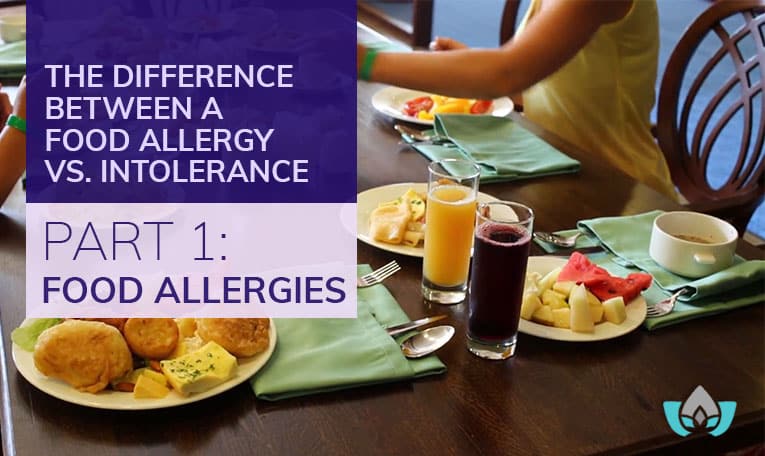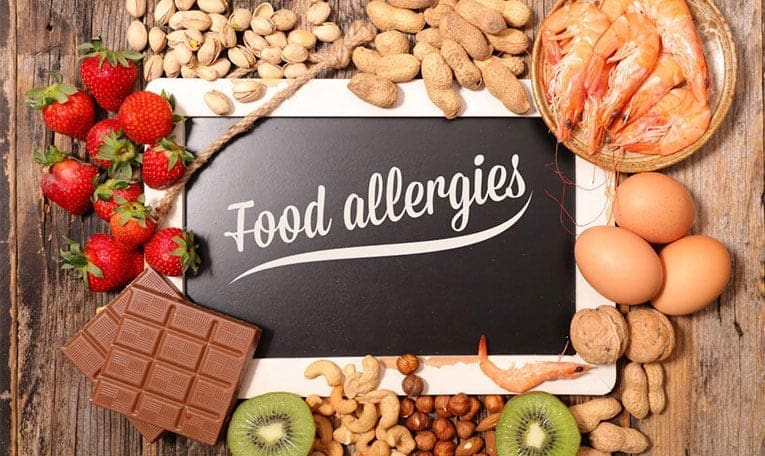
“Oh, I can’t eat that”
“I have a gluten sensitivity”
“I’m allergic to dairy”
These are all phrases you have probably heard at some point or another – maybe you’ve even used them yourself.
But what does it all mean? An allergy, vs an intolerance.
At our Streetsville naturopathic clinic, we can help you sort out the differences between food allergies and intolerances, and look at what you can do about it if you have one.
What Is A Food Allergy?
Food allergies trigger an immune system response, which can have effects on many different organs.
In the most severe cases, food allergies can have life threatening results, and even a tiny amount of the food can trigger symptoms.
With an intolerance, on the other hand, symptoms are less severe, and you may even be able to eat small amounts of foods you are intolerant to, with minimal consequences.
Although food allergies and intolerances are often confused, allergies are far more serious.
Food Allergy Symptoms
An allergic reaction may show responses such as:
● Itchiness or tingling in or around the mouth
● Hives
● Swollen lips, face, tongue, or throat
● Difficulty breathing
● Abdominal pain, nausea, vomiting
● Lightheadedness and fainting
The most severe food allergies can result in an anaphylactic response.
This is a life-threatening response, which causes swelling in the throat and a constriction of the airways, which makes breathing difficult or impossible.
Other symptoms of anaphylaxis include:
● Shock
● Severe drop in blood pressure
● Rapid pulse
● Loss of consciousness
If you suspect someone is suffering from anaphylactic shock, emergency medical intervention is critical – call 9-1-1 immediately.
People with serious known allergies may also carry an EpiPen- this provides a shot of epinephrine, which can temporarily help open airways. Check them for an EpiPen, or ask somebody with them if they know where it is.
Common Food Allergens
Although allergies can develop to literally anything, there are certain foods which seem to be more commonly the cause of allergic reactions.
Some common food allergens include:
● Fish, including shellfish
● Peanuts and tree nuts
● Eggs
● Wheat
● Soy
● Cow’s milk
What Causes Food Allergies?
Food allergies occur because your immune system mistakes specific foods or substances as being harmful.
This causes the immune system to respond by releasing the antibody immunoglobulin E (IgE) in an attempt to neutralize the substance it deems harmful.
On subsequent exposures to the offending food or substance, IgE antibodies send signals to your immune system to release histamine into your bloodstream, which causes allergy symptoms.
Naturopathic Treatments For Food Allergies
There are a number of ways to treat food allergies naturally.
These treatments and supplements can help to boost the immune system, enhance the gut microbiome and reduce the development of food allergies and symptoms.
Again, we should note if someone is experiencing anaphylactic shock, emergency medical intervention is required, and use of an EpiPen if available.
With that in mind, let’s look at some natural ways to deal with food allergies.
Avoid Your Allergens
This one is probably obvious, however depending on what your allergies are, may be easier said than done.
An allergy to eggs, for example, is more complicated than simply opting for pancakes instead of an eggs benedict. Eggs are an ingredient in many of the foods we eat on a day-to-day basis, so it’s important to be vigilant.
Avoid Other Common Allergens
Although you may not be allergic to everything, avoiding other common allergens can be a smart order if you already have issues with allergies.
Foods such as gluten, eggs, cow’s milk, soy, wheat, and peanuts can increase inflammation, weaken the immune system, and cause digestive issues.
Eat More Leafy Greens
While some of the foods listed above are more likely to cause allergic reactions, on the other end of the spectrum are foods which are very unlikely to cause a reaction, and can actually help to boost your immune system.
Leafy greens such as kale, spinach, collard greens, and arugula are among these.
These veggies are high in vitamins, minerals, and antioxidants.
Keeping these foods as a regular part of your diet will help to boost your immune system and can help to increase antibody response.
Eat More Probiotics
Probiotics are great for supporting the immune system and can help to repair damage to the intestinal lining.
Fermented foods such as kefir, kimchi, kombucha, and sauerkraut may help to reduce your sensitivity to triggers which lead to allergy symptoms.
Try An Elimination Diet
A 2013 study in the journal Nutrition Research and Practice showed that an elimination diet can help to treat eczema; however, when restricting food it is important to be aware of nutrients.
Elimination diets involve removing possible allergens from your diet, and then gradually re-introducing them over a period of time, to determine which ones are the cause of your allergies.
They will typically last for three to six weeks, to give your body a chance to clear itself of the antibodies which react negatively to food, and to allow your body to heal.
Contact The Mindful Healing Clinic
Do you suspect you have food allergies, and want to know for sure?
Or do you know you have allergies and need help managing them?
Contact the Mindful Healing Clinic today, and we will help to create a plan to manage your allergies.
If you have reactions to certain foods, but suspect they are not full-blown allergies, keep your eyes on this space, when we will talk about food intolerances.
Until next time,
Dr. Maria Cavallazzi, N.D
Mindful Healing Naturopathic Clinic
Mississauga, ON L5M 1L7
(905) 819-8200
► https://g.page/MindfulClinicNaturopathic
Dr. Maria Cavallazzi is a medical doctor from Colombia where she practiced as a family physician for 8 years until she moved to Canada 16 years ago and became a naturopathic doctor in Mississauga.



